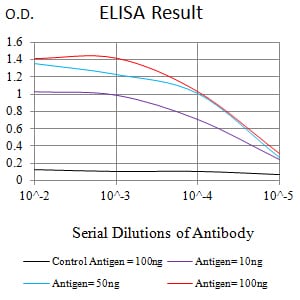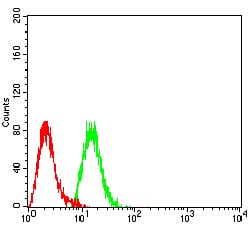

| WB | 咨询技术 | Human,Mouse,Rat |
| IF | 咨询技术 | Human,Mouse,Rat |
| IHC | 咨询技术 | Human,Mouse,Rat |
| ICC | 技术咨询 | Human,Mouse,Rat |
| FCM | 1/200 - 1/400 | Human,Mouse,Rat |
| Elisa | 1/10000 | Human,Mouse,Rat |
| Entrez GeneID | 9112 |
| clone | 7G9C10 |
| WB Predicted band size | 80.8kDa |
| Host/Isotype | Mouse IgG2a |
| Antibody Type | Primary antibody |
| Storage | Store at 4°C short term. Aliquot and store at -20°C long term. Avoid freeze/thaw cycles. |
| Species Reactivity | Human |
| Immunogen | Purified recombinant fragment of human MTA1 (AA: 541-715) expressed in E. Coli. |
| Formulation | Purified antibody in PBS with 0.05% sodium azide |
+ +
以下是3篇关于MTA1抗体的参考文献,涵盖其功能研究及实验应用:
---
1. **文献名称**: *MTA1. a Metastasis-associated Gene, Enhances Vimentin Expression and Tumor Cell Growth in vitro*
**作者**: Toh Y, Nicolson GL
**摘要**: 该研究利用MTA1特异性抗体(如抗人MTA1多克隆抗体)进行Western blot和免疫组化分析,发现MTA1过表达促进肿瘤细胞中波形蛋白(vimentin)的表达,增强细胞迁移和侵袭能力,提示其在癌症转移中的关键作用。
---
2. **文献名称**: *MTA1 Interacts with HDAC1/2 to Regulate Gene Transcription in Breast Cancer Cells*
**作者**: Mazumdar A, et al.
**摘要**: 通过免疫共沉淀(Co-IP)和染色质免疫沉淀(ChIP)实验,使用MTA1抗体证实MTA1与组蛋白去乙酰化酶HDAC1/2形成复合物,共同抑制雌激素受体靶基因的转录,揭示了其在乳腺癌表观遗传调控中的机制。
---
3. **文献名称**: *Development of a Novel Monoclonal Antibody Against MTA1 for Diagnostic Applications*
**作者**: Li Y, et al.
**摘要**: 本研究报道了一种新型抗MTA1单克隆抗体的开发,验证其在ELISA、免疫荧光和病理切片中的特异性。该抗体在肝癌组织中检测到MTA1高表达,与患者不良预后显著相关,支持其作为潜在诊断标志物。
---
**备注**:如需具体文献来源或更多信息,可通过PubMed或Google Scholar搜索标题及作者获取全文。
The MTA1 (Metastasis-associated protein 1) antibody is a critical tool for studying the role of the MTA1 protein in cellular processes and disease pathogenesis. MTA1. a member of the MTA protein family, was first identified as a metastasis-regulating factor in cancer. It functions as a transcriptional coregulator within the nucleosome remodeling and histone deacetylation (NuRD) complex, modulating gene expression by altering chromatin structure. MTA1 is implicated in diverse pathways, including DNA repair, cell proliferation, epithelial-mesenchymal transition (EMT), and angiogenesis, with overexpression observed in numerous cancers (e.g., breast, prostate, colorectal) linked to metastasis, therapy resistance, and poor prognosis.
MTA1 antibodies are designed to detect endogenous MTA1 isoforms (∼80 kDa) and are widely used in techniques like Western blotting, immunohistochemistry (IHC), immunofluorescence (IF), and co-immunoprecipitation (Co-IP). These antibodies help researchers investigate MTA1's subcellular localization (primarily nuclear), expression levels in pathological vs. normal tissues, and interactions with binding partners (e.g., ERα, HIF-1α). Validating antibody specificity is crucial due to potential cross-reactivity with homologous family members (MTA2. MTA3). Both monoclonal and polyclonal variants are available, with clones like D4E7 (CST) and EP1003Y commonly cited. Recent studies also explore MTA1's non-oncogenic roles in inflammation, neurodegeneration, and metabolic disorders, broadening the antibody's research applications.
×